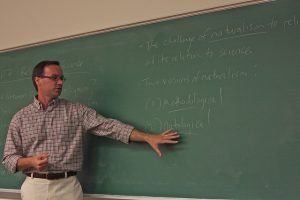Georgetown’s Graduate School of Arts and Sciences announced that the U.S Department of Education awarded the school’s Program of Educational Transformation (MAET) a $2.6 million, five-year National Professional Development (NPD) grant to support Project ELEECT (English Learners’ Educational Excellence Capitol Teacher Training). The project serves to alleviate a long-standing deficiency in multilingual education training for new and existing teachers in D.C. public schools.
The project is led by three principal investigators, Prof. Sabrina Wesley-Nero and Prof. Crissa Stephens. Both bring their experience with multilingual teaching and research in community-oriented efforts to promote educational equity and lead the pedagogical and sociolinguistic concentrations of the program. Prof. Douglass Reed, also the director of the master’s program in educational transformation, focuses on administration and coordination within the project.
Project ELEECT partners with more than 15 local charter schools, as well as D.C. public schools, and was designed with the NPD grant in mind. The grant supports both of Project ELEECT’s main goals: providing professional support and increasing the financial accessibility of training for existing and aspiring teachers. It will fund 80 percent of the cost for a new graduate certificate program for experienced teachers looking to become more effective educators of bilingual children, while also covering 30 percent of the tuition for students pursuing a degree in educational transformation. Graduates from this 12-month teacher residency program are equipped to teach in ESL and dual language programs, providing a valuable resource and skill to schools with which the program partners.
In lieu of the full residency program, the grant will also support in-service and aspiring teachers by providing more opportunities for them to receive this training.
“I think it will broaden the pool of settings where teachers can get training in order to serve their emerging bilingual students,” Stephens said.
The principal investigators also stressed the importance of collaborating with communities of interest to learn about specific needs for teacher training and the nuances of developing a strong base for multilingual students.
“It was really a kind of ground-up approach to policy making: thinking and talking to teachers, talking to school leaders about the kind of professional development that they want.” Reed said. “The teachers we’re looking for are largely those that have multilingual capacities, and we want to be able to draw on those strengths.”
“It’s one thing to speak a language, it’s another thing to develop skills about how to teach a language,” Reed added.
The team also stressed the importance of multilingual teaching in the context of the increasing language and racial diversity within the D.C. metropolitan area. D.C.’s immigrant community has steadily grown in size, and the city ranks among the five most diverse in the United States. Roughly 17 percent of children in D.C. ages 5-17 speak a language at home other than English, and 12.1 percent of D.C. residents are foreign-born. The high concentration has led to a wide array of languages in the DMV area—including Spanish, Amharic, Chinese, French, Vietnamese, and Korean—stemming from prominent Latin American, East African, and East Asian immigrant communities.
“Nationally you often see disparities in educational outcomes across those lines so that’s one thing,” Stephens said of the disproportionately high public school enrollment rates of people of color compared to their white peers. “The other thing also are issues of culture and identity and the ways people’s linguistic identities are actually also sometimes intertwined with their racial identities.”
One primary way the project aims to resolve this source of educational inequity comes in the form of supporting faculty of color.
“Research indicates that students of color can achieve higher educational outcomes when they have teachers who share their social identities,” Wesley-Nero said. “A diverse teaching force benefits everyone.”
The five-year grant awarded this November enables Project ELEECT to build a foundation for community engagement and impact, and the program architects look to leverage a feedback system built into the project through which adjustments can be made based on annual evaluations. They also strongly encourage Georgetown undergraduates to consider getting involved through taking the undergraduate inquiry and justice program, or enrolling in the graduate program itself.
“It’s a real opportunity to use your linguistic strengths and use your linguistic knowledge base and work with students from all over the world,” Reed said. “If you like teaching, if you like being in a classroom, if you like using language in interesting ways, I think this is an excellent opportunity for students to get their master’s degree in a way that can do good in the world.”







